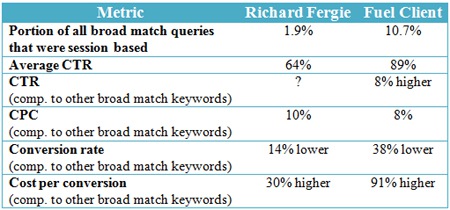Google not too long ago added another sort of broad match called “session-based”. This is the AdWords side of personalized search results.
What happens is: searchers continue to see ads based on earlier search queries.
Problem: Irrelevant Searches Within the Same Session
Some AdWords advertisers report fairly irrelevant ads showing up after a searcher has changed the focused of their searches.
You can see what those queries are via the Search Query Report, and you can exclude them with negative keywords, but how could you ever exclude every irrelevant search someone might type in after changing their search focus? You can’t.
Quantifying The Effects of Session-Based Broad Match
Richard Fergie over at the SEOptimise blog wrote up some stats on broad session based match results, but the results I saw recently for a Fuel consulting client (Amazing Wine Club) were quite different in some ways, so I wanted to add to that conversation here.
As Richard said…
Just under 2% of all broad match queries were session based. As speculated, I think this number will depend a lot on your vertical and how much you bid per click.
Here’s a comparison of our results and those for Richard’s client (and I wish Richard had mentioned the vertical of that client):

Observations
- The CTR is artificially inflated because it’s based on very unique queries. This is like an ad that temporarily has a 30,000% ROI because it happened to get a sale in its first few clicks- the performance looks better than it really is.
- The CTR comparison is an average per query, not overall, so it’s much higher and similar to the broad-session-based CTR number.
- Conversion rate and cost per conversion differences between Richard’s client and mine are striking. A 91% higher cost per conversion is a major difference. Even though session-based were only 10% of all broad match, AdWords has significantly reduced the ROI of broad-match here.
Opinion
The broad-session-based feature, in my opinion, is yet another of the maddening areas where AdWords refuses to give the advertiser full control- whether because it’s a lower priority for them or because it fulfills other organizational or financial goals, the advertiser loses out here.




![[SEO, PPC & Attribution] Unlocking The Power Of Offline Marketing In A Digital World](https://www.searchenginejournal.com/wp-content/uploads/2025/03/sidebar1x-534.png)